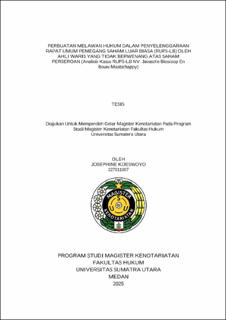| dc.description.abstract | The EGMS case of NV. Javasche Bioscoop en Bouw Maatschappy is
ignificant due to its complexity compared to other EGMS cases. This complexil
rises from the inheritance of company shares. This study aims to analyze th
legality of the heirs' claim of ownership of NV. Javasche Bioscoop en Bouw
Maatschappy's shares in the context of inheritance law and corporate law, the
EGMS proceedings, and the legal implications of the EGMS and the company's
liquidation decision carried out by parties lacking full authority over the
company's shares.
The research method used is normative juridical, based on library
research to obtain secondary data, including primary, secondary, and tertiary
legal materials relevant to the research problem, analyzed normatively and
qualitatively.
Based on the analysis of the NV. »Javasche Bioscoop en Bouw
Maatschappy case, it can be concluded that the heirs' share ownership claim has
a strong legal basis from both inheritance law proven by the Heirs' Certificate
and Court Decree-and corporate law, as documented in Deed No. 62 of 1962.
Conducting the EGMS without involving all shareholders constitutes an unlawful
act, violating several provisions of Law No. 40 of 2007, particularly regarding
EGMS procedures (Articles 79, 82, and 85), while disregarding shareholders'
rights. Consequently, the EGMS and its resulting liquidation decision are null and
void based on the principle "acta nullius, nullum producit effectum," especially
since it failed to meet the minimum quorum requirement of 3/4 of the total shares
with valid voting rights as stipulated in Article 142 of Law No. 40/2007. This
opens the possibility of a compensation claim based on Article 1365 of the
Indonesian Civil Code concerning unlawful acts. | en_US |


